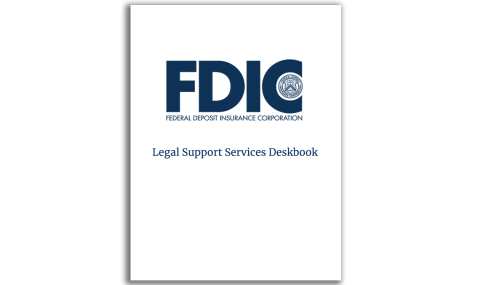
Electronic Funds Transfer (EFT) Requirements
PDF Help - Information on downloading and using the PDF reader.
(Note: These requirements were written for outside counsel but also apply to experts and LSS providers.)
Payments by the FDIC under legal referrals may be made by check or electronic funds transfer (EFT) at the option of the FDIC. If payment is made by EFT, the FDIC may, at its option, also forward the associated payment information by electronic transfer. As used herein, the term "EFT" refers to the funds transfer and may also include the information transfer.
Mandatory Submission of EFT Information
Outside counsel is required, as a condition to any payment under a legal referral, to provide the FDIC with the information required to make payment by EFT as described below, unless the FDIC determines that submission of the information is not required. Outside counsel shall provide EFT information as described below unless waiver is granted. This information shall apply to all legal referrals outside counsel may receive. If outside counsel has multiple remittance offices, EFT information may be required for each remittance office.
Outside Counsel's EFT Information
Prior to submission of the first request for payment under a legal referral, outside counsel shall confirm the accuracy of EFT information previously provided the FDIC. If the EFT information changes, outside counsel is responsible for providing the changed information to the FDIC.
Required EFT Information
The FDIC may make payment by EFT through either an Automated Clearing House (ACH) subject to the banking laws of the United States or the Federal Reserve Wire Transfer System at the FDIC's option. Outside counsel shall provide the following information for both methods in a form acceptable to the FDIC. See the attached form.
- The tax identification number.
- Outside counsel's name and remittance address and account number at outside counsel's financial agent.
- The signature (manual or electronic, as appropriate), title, and telephone number of the outside counsel official authorized to provide this information.
For ACH payments only:
- Name, address, and 9-digit Routing Transit Number of outside counsel's financial agent.
- Outside counsel's account number and the type of account (checking, saving, or lockbox).
For Federal Reserve Wire Transfer System payments only:
- Name, address, telegraphic abbreviation, and the 9-digit Routing Transit Number for outside counsel's financial agent.
- If outside counsel's financial agent is not directly on-line to the Federal Reserve Wire Transfer System and, therefore, not the receiver of the wire transfer payment, outside counsel shall also provide the name, address, and 9-digit Routing Transit Number of the correspondent financial institution receiving the wire transfer payment.
Suspension of Payment
Notwithstanding the provisions of the LSA, the FDIC is not required to make any payment under a legal referral until after receipt, by the appropriate FDIC office, of the correct EFT payment information from outside counsel, a certificate is submitted or a waiver is granted. Until receipt of the correct EFT information, any invoice shall be deemed not to be a valid invoice.
If the EFT information changes after submission of correct EFT information, the FDIC shall begin using the changed EFT information no later than the 30th day after its receipt to the extent payment is made by EFT. However, outside counsel may request that no further payments be made until the changed EFT information is implemented by the FDIC.
Outside Counsel EFT Arrangements
Outside counsel shall designate a single financial agent capable of receiving and processing the electronic funds transfer using the EFT methods described above. Outside counsel shall pay all fees and charges for receipt and processing of transfers.
Liability for Uncompleted or Erroneous Transfers
If an uncompleted or erroneous transfer occurs because the FDIC failed to use the outside counsel-provided EFT information in the correct manner, the FDIC remains responsible for (i) making a correct payment and (ii) recovering any erroneously directed funds.
If an uncompleted or erroneous transfer occurs because outside counsel-provided EFT information was incorrect at the time of FDIC release of the EFT payment transaction instruction to the Federal Reserve System, and
- If the funds are no longer under the control of the FDIC, the FDIC is deemed to have made payment and outside counsel is responsible for recovery of any erroneously directed funds; or
- If the funds remain under the control of the FDIC, the FDIC retains the right to either make payment by mail or suspend the payment in accordance with provision above.
EFT and Assignment of Claims
If outside counsel assigns the proceeds of a legal referral, the assignee shall provide the assignee EFT information required herein. In all respects, the requirements of this provision shall apply to the assignee as if it were outside counsel. EFT information that shows the ultimate recipient of the transfer to be other than outside counsel, in the absence of a proper assignment of claims acceptable to the FDIC, is incorrect EFT information for purposes of these requirements.
FDIC Discretion
If outside counsel does not wish to receive payment by EFT methods for one or more payments, outside counsel may submit a request to the FDIC to refrain from requiring EFT information or using the EFT payment method. The decision to grant the request is solely that of the FDIC.
Change of EFT Information by Financial Agent Outside counsel agrees that outside counsel's financial agent may notify the FDIC of a change to the routing transit number, outside counsel account number, or account type. The FDIC shall use the changed data in accordance with the provisions above. Outside counsel agrees that the information provided by the agent is deemed to be correct information as if it were provided by outside counsel. Outside counsel agrees that the agent's notice of changed EFT data is deemed to be a request by outside counsel in accordance with the provisions that no further payments be made until the changed EFT information is implemented by the FDIC.
